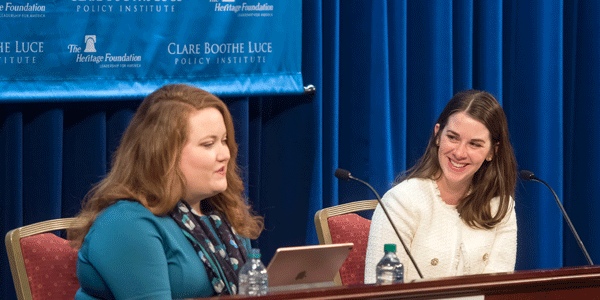
At the February Conservative Women’s Network luncheon, Heritage Foundation legal analysts Tiffany Bates and Elizabeth Slattery highlighted several important cases that are before the U.S. Supreme Court this year.
Janus v. American Federation of State, County, and Municipal Employees (AFSCME)
This is a First Amendment case to decide whether non-union employees can be forced to pay “agency fees” to a union.
A 1987 court decision held that public school employees could be forced to pay such fees even if they opted out of union membership and disapproved the union’s use of their fees to fund political candidates with whom they disagreed.
Janus is asking the high court to overrule the 1987 decision and find “agency fees” unconstitutional. Recent court decisions suggest the court has been rethinking the 1987 decision – the most recent case, decided shortly after the death of Justice Scalia, ended in a 4-4 tie. The court’s decision in this case could have a far-reaching impact.
Minnesota Voters Alliance v. Mansky
Another First Amendment case, this case deals with voters rights at the ballot box.
Minnesota passed a law allowing polling place officials to bar eligible voters from casting their vote if they wear clothing that advocates candidates or issues. The state argues such restrictions are necessary to maintain an orderly election environment.
Petitioners argue this law is not necessary and it is too broad and vague to be reasonably applied. The state has other laws that prohibit campaigning for a candidate or ballot initiative within 100 feet of polling places, and threatening, intimidating or coercing voters – measures which already ensure an orderly environment.
At least 9 other states have a law with bans similar to Minnesota’s that has yielded some rather peculiar unintended consequences. In Arkansas, for example, voters wearing decades-old “Reagan-Bush” tee shirts and “I Miss Bill” tee shirts have been banned from casting their votes. In 2012, a voter wearing MIT college sweatshirt was banned because Mitt Romney was on the ballot. In 2008, a Texas woman wearing a tee shirt with an Alaska landscape was banned because Alaska Governor Sarah Palin was on the ballot.
U.S. v. Microsoft
At issue in this case is whether Microsoft, a U.S. based technology firm, must turn over email data stored in Ireland when presented with a U.S. warrant for that information.
The presumption is that U.S. warrants are only valid in U.S. territory, but the law in question was enacted before the era of technology data storage across national boundaries. The court decision could have far-reaching impact on privacy issues.
South Dakota v. Wayfair Inc.
If you do a lot of shopping online, the decision in this case may directly affect you.
It is an internet sales tax case and one of several in the “Kill Quill” movement. A 1992 decision, Quill v. North Dakota, ruled that states can’t force out-of-state retailers to collect state sales taxes when their residents make a purchase. Many states were unhappy with that ruling.
South Dakota passed a law requiring out-of-state retailers to collect state sales taxes when their residents make a purchase. Wayfair and Overstock refused to comply, so South Dakota brought the lawsuit.
Interestingly, the largest national online retailer, Amazon, now voluntarily collects state sales taxes for every state.
To hear about additional cases, watch the analysts’ full presentation:
